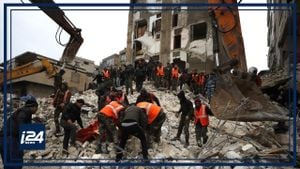The upcoming Iraqi elections set for March 2025 are shaping up to be pivotal, potentially steering the nation toward significant political reform amid rising public discontent. With campaigns already gaining momentum, the elections are poised to address the increasing dissatisfaction among Iraqi citizens, who have voiced their frustrations through protests against government corruption and inefficiency.
This vote is not merely about filling seats; it's seen as the latest opportunity for Iraqis to reshape their political environment after years of turbulent governance. Political analysts like Ahmed Al-Saadi stress the importance of these elections, stating, "We need changes not just at the top but throughout the system to regain public trust," as reported by Al Jazeera. This sentiment is echoed widely, illustrating the populace's call for transformation.
The elections will be conducted under revised electoral regulations aimed at enhancing transparency and citizen involvement. These changes come as part of the government’s response to widespread protests and demands for more accountable governance. Experts like Dr. Fatima Jaber from the Iraqi Institute for Strategic Studies remind us, "The upcoming elections will be pivotal for Iraq's future stability,” highlighting the weight of this political moment.
Scheduled to take place throughout Iraq, including key regions such as Baghdad and Basra, these elections will also witness increased scrutiny from international observers determined to uphold electoral integrity. The Iraqi government has expressed its commitment to fair practices, hoping to mitigate any doubts about the election's credibility.
Public engagement has surged as citizens recognize the significance of their votes. Many are eager to see new faces representing their communities, reflecting the desire for fresh leadership and innovative solutions to long-standing issues. The political climate, imbued with anticipation and trepidation, marks this election as more than just administrative; it’s about securing hope for the nation’s future.
Beyond the immediate electoral mechanics, there is the broader question of reconciliation and recovery from past governance failures. Iraq has faced immense challenges over the years, including conflict, economic strife, and sectarian tensions. Therefore, the 2025 elections are being closely monitored not only for their political outcomes but also for their potential to heal the social fabric of the nation.
With diverse political parties preparing to compete and numerous independent candidates entering the fray, the public pulse seems to lean toward reform. Citizens are calling for comprehensive agendas rather than superficial promises, reflecting their deep-seated urges for genuine change.
While many challenges remain, including entrenched corruption and security issues, the 2025 elections represent a flicker of potential for Iraqi democracy. Having endured years of ineffective governance, the hope is for leaders who resonate with the people’s aspirations and can navigate the complex geopolitical realities surrounding Iraq.
To sum it up, the stakes are high as Iraq approaches its unified polls. Whether these elections can effectively channel the public’s voice and deliver on promises of reform will be determined not just by the ballots cast but by the follow-through from those elected. The world watches with bated breath, as the outcome could redefine Iraq’s political scene for years to come.



